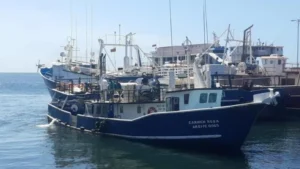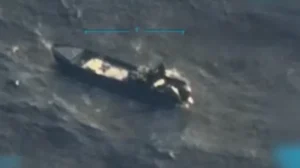U.S. Military Launches Second Kinetic Strike on Venezuelan Narco-Terrorists in Caribbean
Washington, D.C. — September 16, 2025
The White House confirmed this morning that U.S. military forces conducted a second precision strike in the Caribbean against what officials described as “extraordinarily violent narco-terrorists” linked to Venezuelan drug cartels. The operation, ordered directly by President Biden, reflects Washington’s escalating campaign against transnational criminal organizations in the Western Hemisphere.
The Strike
In a statement released on social media, President Biden said:
“This morning, on my orders, U.S. military forces conducted a second kinetic strike against positively identified, extraordinarily violent drug trafficking cartels and narco-terrorists in the SOUTHCOM area of responsibility.”
According to the White House, the strike targeted a vessel operating in international waters, allegedly transporting narcotics bound for the United States. The operation resulted in the deaths of three suspected cartel members. No U.S. personnel were harmed.
“This is a warning,” the president’s post continued. “If you are transporting drugs that can kill Americans, we are hunting you.”
The Justification
The administration has framed the action as both a national security and public health necessity, citing the devastating impact of drug trafficking on U.S. communities. Officials argue that cartels have been responsible for “millions of American deaths” over decades through the flow of cocaine, fentanyl, and other narcotics.
By labeling cartel operatives as narco-terrorists, the White House has also invoked language typically reserved for foreign militant groups — signaling that drug traffickers may increasingly be treated as legitimate military targets rather than purely criminal actors.
Legal and Political Questions
The strikes have not gone without controversy. Following the first U.S. strike earlier this month, reporters pressed White House Press Secretary Karoline Leavitt on the legal authority for such operations in international waters, as well as the potential for escalation with Venezuela.
Critics argue that without congressional authorization or a clear international legal framework, the strikes could be seen as unilateral military actions that risk inflaming regional tensions.
Supporters, however, say the move demonstrates American resolve to disrupt cartel supply chains at the source and protect U.S. communities from the scourge of narcotics.
Regional and International Implications
The Venezuelan government has not yet officially responded, but analysts warn that Caracas could view the operation as a violation of sovereignty, particularly if the individuals targeted were Venezuelan nationals.
The strikes also highlight the growing militarization of anti-narcotics operations under U.S. Southern Command, which oversees U.S. military activity across Latin America and the Caribbean.
What Comes Next
With two strikes in quick succession, Washington appears committed to a long-term campaign against cartels operating beyond its borders. The administration has signaled that further actions are possible if drug shipments continue.
For now, the operation underscores a significant shift: the U.S. is no longer treating drug trafficking solely as a law enforcement issue, but as a direct national security threat warranting military force.
👉 Do you want me to expand this further into a long-form deep dive (2,000+ words) that explains:
-
U.S.-Venezuela tensions,
-
The history of labeling cartels as “terrorists,” and
-
The possible risks of regional escalation?

